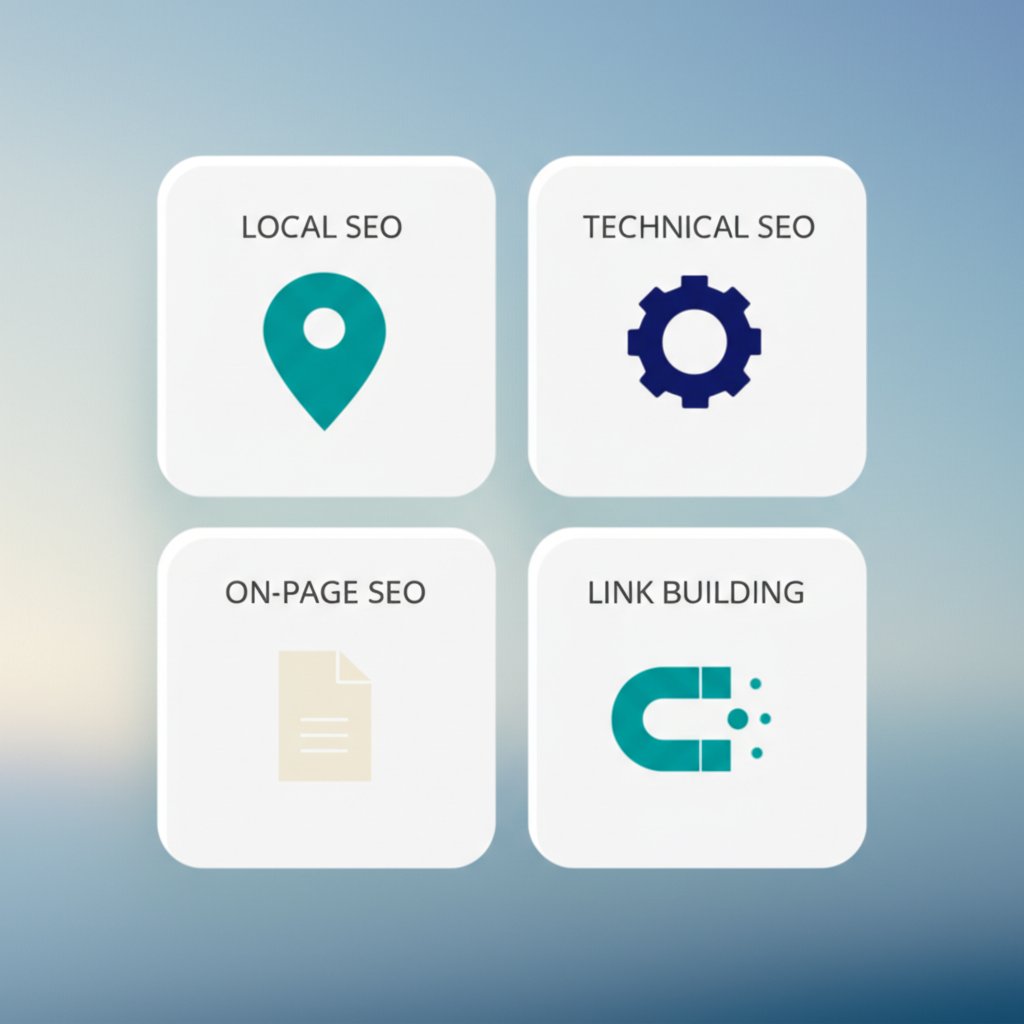TL;DR
Small business SEO services are specialized digital marketing strategies designed to improve your company's visibility in search engine results. The primary goals are to increase website traffic, attract more local customers, and generate qualified leads and sales. Choosing the right provider involves evaluating their track record, understanding their process, and aligning their strategies with your specific business objectives for a strong return on investment.
What Are SEO Services and Why Are They Crucial for Small Businesses?
Search Engine Optimization (SEO) services are a comprehensive suite of actions taken to improve a website's ranking on search engines like Google. For a small business, this isn't just about keywords and code; it's a fundamental strategy for survival and growth in a competitive digital marketplace. It's the process of signaling to search engines that your business is a credible, authoritative answer to a potential customer's question. This process involves technical adjustments to your site, creating valuable content, and building your online reputation.
A common question is, "Does SEO really work for small businesses?" The answer is a definitive yes. Effective SEO levels the playing field, allowing you to compete with larger companies by targeting specific local areas and niche customer segments. According to industry experts, SEO is a powerful strategy to grow brand awareness, drive relevant website traffic, and ultimately increase revenue. It helps you connect with users who are actively searching for the products or services you offer, making it one of the most effective forms of digital marketing.
Deciding whether to manage SEO in-house or hire a professional agency is a critical first step. While DIY SEO can seem cost-effective, it requires significant time, expertise, and investment in tools. An agency brings specialized knowledge, experience, and resources that can accelerate results and avoid costly mistakes. Here’s a comparison to help you decide:
| Aspect | DIY SEO | Hiring an SEO Agency |
|---|---|---|
| Cost | Lower initial cash outlay, but high time commitment and tool costs ($100-$500+/month). | Higher monthly investment, but includes expertise, tools, and dedicated management. |
| Expertise | Steep learning curve; risk of implementing outdated or incorrect strategies. | Access to a team of specialists in technical SEO, content, and link building. |
| Time Commitment | Very high; takes focus away from core business operations. | Minimal; frees you to focus on running your business while experts handle the SEO. |
| Results | Can be slow and inconsistent; difficult to scale. | Typically faster and more sustainable results based on proven processes. |
Core SEO Services Your Small Business Can't Ignore
When you invest in SEO, you're not buying a single product but a collection of integrated services. Understanding these core components empowers you to have more productive conversations with potential providers and ensure you're getting a comprehensive strategy tailored to your needs. While offerings can vary, three pillars are non-negotiable for small business success.
1. Local SEO: Winning the Neighborhood
For businesses with a physical location or service area, local SEO is the most critical component. It focuses on making your business visible in location-based searches, such as "plumber near me" or "best coffee shop in Brooklyn." A cornerstone of this service is creating and optimizing your Google Business Profile (GBP). A well-managed GBP with positive reviews, accurate information, and regular posts can significantly boost your visibility on Google Maps and in the local search results, driving foot traffic and phone calls.
2. On-Page & Technical SEO: The Foundational Blueprint
On-page and technical SEO ensure your website is built to be understood and favored by search engines. On-page SEO involves optimizing individual page elements, such as titles, headings, and content, with relevant keywords to signal what the page is about. Technical SEO addresses the backend structure of your site, focusing on factors like site speed, mobile-friendliness, and secure connections (HTTPS). A technically sound website provides a better user experience, which Google rewards with higher rankings.
3. Content Marketing & Link Building: Building Authority
Content is the fuel for your SEO engine. High-quality content, such as blog posts, guides, and articles, demonstrates your expertise and provides value to your audience. This builds trust and gives other websites a reason to link to you. Link building is the process of acquiring these links (or backlinks) from other reputable websites, which act as "votes of confidence" in the eyes of search engines. To maintain a consistent content schedule, many small businesses leverage tools to streamline their workflow. For instance, platforms like BlogSpark use AI to help generate SEO-optimized article drafts, freeing up teams to focus on strategy and promotion.
How to Choose the Right & Affordable SEO Provider
Selecting the right SEO partner is one of the most important marketing decisions a small business can make. The right agency becomes an extension of your team, driving tangible growth. The wrong one can waste your budget and set you back. Use a structured approach to vet potential providers and find a partner that aligns with your goals and values.
Start by evaluating their expertise and past performance. Reputable agencies are proud of their results and will have case studies, testimonials, and reviews readily available. Directories like Semrush can be a good starting point to find vetted companies with a proven track record. During your initial conversations, ask pointed questions to understand their process. A trustworthy partner will be transparent about their strategies, how they measure success, and what you can expect from their reporting.
Finally, be aware of common red flags. Be wary of any company that guarantees a #1 ranking on Google, as no one can promise this. Vague strategies, a lack of transparent reporting, or high-pressure sales tactics are also signs that you should look elsewhere. Use this checklist to guide your conversations:
- What is your process for keyword research and strategy development?
- Can you show me examples of results you've achieved for businesses similar to mine?
- How do you measure the success of an SEO campaign? What KPIs do you track?
- What will your monthly reports look like, and how often will we meet to discuss progress?
- What is your approach to link building and content creation?
- What are the terms of your contract? Is it a long-term commitment?

Understanding SEO Pricing: What Should a Small Business Expect to Pay?
Cost is a primary concern for any small business, and SEO pricing can seem opaque. Prices vary widely based on the scope of work, your industry's competitiveness, and your business goals. Most agencies use one of a few common pricing models, each with its own pros and cons. Understanding these models is the first step toward setting a realistic budget.
The most common model is a monthly retainer, where you pay a fixed fee each month for ongoing services. This is often the most effective for long-term SEO, as it allows the agency to build momentum. Project-based pricing is used for one-time tasks like a website audit or a site migration. Hourly consulting is less common for comprehensive campaigns but can be useful for specific, targeted advice. According to some NYC-based providers, local SEO services can start around $599 per month for small businesses.
Ultimately, it's crucial to view SEO as an investment, not an expense. The goal is to generate a positive return on investment (ROI) through increased leads, sales, and customer lifetime value. When evaluating cost, consider the potential value it will bring to your business. A well-executed SEO strategy from a partner like WebFX can become your most profitable marketing channel over time.
| Pricing Model | Typical Monthly Range (USD) | Best For |
|---|---|---|
| Monthly Retainer | $750 – $2,500+ | Ongoing, comprehensive SEO strategy for sustained growth. |
| Project-Based | Varies ($1,000 – $7,500+) | Specific, one-time needs like a technical audit or content overhaul. |
| Hourly Consulting | $100 – $300+ | Targeted advice, training, or troubleshooting specific issues. |
The Right SEO Partner: Your Engine for Growth
Navigating the world of small business SEO services can feel overwhelming, but it's a critical step toward securing your company's digital future. By understanding the core services—from local optimization to content and link building—you can identify what your business truly needs. The key to success lies not just in the tactics but in the partnership you form. Choosing a transparent, results-oriented provider who understands your unique goals is the most important investment you can make. With the right strategy and a trusted partner, SEO becomes more than just marketing; it becomes a reliable and powerful engine for sustainable business growth.

Frequently Asked Questions About Small Business SEO
1. Does SEO really work for small businesses?
Absolutely. SEO is one of the most effective digital marketing strategies for small businesses. It helps you increase your visibility in search results, attract more qualified traffic to your website, and compete with larger companies in your specific market. A well-executed campaign directly contributes to growing brand awareness, generating leads, and increasing revenue.
2. Which SEO tool is best for small businesses?
There isn't a single "best" tool, as the right one depends on your needs and budget. However, some of the most highly-regarded all-in-one platforms include Semrush for comprehensive management and Ahrefs for competitor and backlink research. For those on a tighter budget, KeySearch is often recommended for affordable keyword research. Many agencies use a combination of these tools to manage client campaigns effectively.




